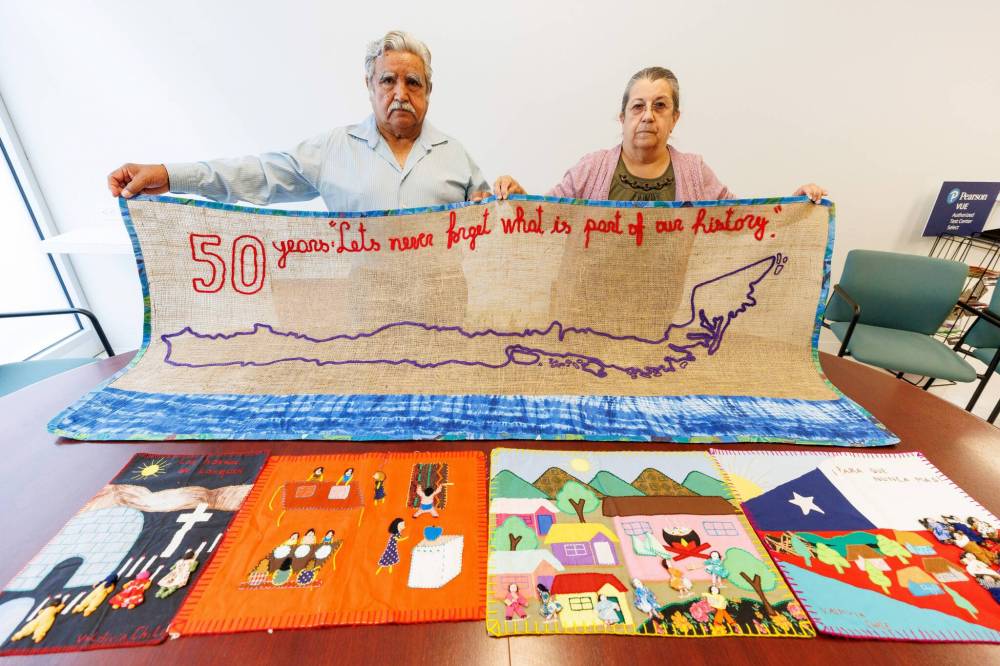City’s Chilean community to mark 50th anniversary of coup
Advertisement
Read this article for free:
or
Already have an account? Log in here »
To continue reading, please subscribe:
Monthly Digital Subscription
$1 per week for 24 weeks*
- Enjoy unlimited reading on winnipegfreepress.com
- Read the E-Edition, our digital replica newspaper
- Access News Break, our award-winning app
- Play interactive puzzles
*Billed as $4.00 plus GST every four weeks. After 24 weeks, price increases to the regular rate of $19.00 plus GST every four weeks. Offer available to new and qualified returning subscribers only. Cancel any time.
Monthly Digital Subscription
$4.75/week*
- Enjoy unlimited reading on winnipegfreepress.com
- Read the E-Edition, our digital replica newspaper
- Access News Break, our award-winning app
- Play interactive puzzles
*Billed as $19 plus GST every four weeks. Cancel any time.
To continue reading, please subscribe:
Add Free Press access to your Brandon Sun subscription for only an additional
$1 for the first 4 weeks*
*Your next subscription payment will increase by $1.00 and you will be charged $16.99 plus GST for four weeks. After four weeks, your payment will increase to $23.99 plus GST every four weeks.
Read unlimited articles for free today:
or
Already have an account? Log in here »
Hey there, time traveller!
This article was published 28/08/2023 (794 days ago), so information in it may no longer be current.
Winnipeg’s Chilean community will mark the 50th anniversary of the coup that drove many of them into exile and brought them here to Canada.
The Canadian Museum for Human Rights will screen Chile: A History in Exile by Winnipeg director Cecilia Araneda at 7 p.m. today. It delves into what she discovered upon returning to Chile in 1995. Her parents had sought refuge in Canada following the 1973 coup d’etat, in which the democratically elected government of Salvador Allende was replaced by a military dictatorship under Augusto Pinochet.
“All the new generation in Chile, they were educated with the vision that the military government was good,” said Bernardo Jorquera, one of the organizers and chair of the Winnipeg Chilean Association Committee. “After that, (Araneda) interviewed a few Chileans that were witnesses … they were incarcerated, they were in concentration camps and she (tells their stories).”

MIKE DEAL / WINNIPEG FREE PRESS
Artist and community activist Beatriz Barahona (right), with Winnipeg Chilean Association Committee chair Bernardo Jorquera, display a commemorative arpillera.
In addition to the screening of the documentary, German Aburto, Francisco Valenzuela, Hector Reyes and Julio Vargas, four people who were political prisoners during the Pinochet era, will speak at the event.
A second event will be held at the Centre Culturel Franco-Manitobain at 340 Provencher Boul. on Sept. 11 at 6 p.m. The day is the exact 50th anniversary of the coup. In addition to a screening of the documentary, the event will include live music, photo collections and a display of arpilleras, patchwork art displayed on burlap or pieces of cloth that were made and sold by Chilean women to supplement their income during the Pinochet dictatorship.
When Pinochet held power from 1973 to 1990, arpilleras became symbols of resistance. They originally depicted everyday scenes but just like life itself, took a dark turn after the coup and began to primarily depict scenes of poverty and government repression.
“Before 1973, arpilleras already existed,” explained Beatriz Barahona, one of the artists and an organizer of the event. “It gets more significant after the military coup because there were so many tragedies happening around in the country. People disappeared, they were in prison, they were dead.
“What happened in villages and in small towns, the women were left alone with the kids and they needed to survive, to make a living,” Barahona explained. “They became more popular because they became a source of income for them.”
While Pinochet was in power, arpilleras were made in workshops organized by the Chilean Catholic Church and then clandestinely distributed abroad by the Vicariate of Solidarity, a human rights organization attached to the church.
A commemorative arpillera designed by women from the Chilean-Canadian community of Winnipeg, specifically for the 50th anniversary of the coup, will be unveiled at the event on Monday. It will include a stitched silhouette of Chile along with four panels depicting scenes related to the coup and its aftermath.
“‘50 years, never forget what is part of our history,’ that is the message in the title of the arpillera itself,” Barahona explained. “One picture (will) depict Chacabuco, (which was) a prison camp, another one which is the government palace in flames when the military was there to kill Allende, another one that is a family shouting in front of TV … the other … has to do with the fishermen, showing people building the nets.”
Jorquera said it’s important to remember the coup and its aftermath, not just to pay tribute to the victims of Pinochet’s regime, but also because it helps remind people of the need to protect and cherish democracy and its freedoms.
“Our main purpose is to remember that democracy is very important, not only in Chile but in the world,” Jorquera said.
Events are also meant to show appreciation to the people and governments of Manitoba and Canada, who welcomed the Chilean refugees and gave them the opportunity to build new lives, he said.
In the immediate aftermath of the coup, from 1973 to 1974, 7,000 Chileans came to Canada as refugees. As of the 2021 census, the Chilean-Canadian community was 45,190 people strong.
The Winnipeg Chilean Association is organizing and funding both events. While admission is free, donations are welcome.
graham.mcdonald@freepress.mb.ca





